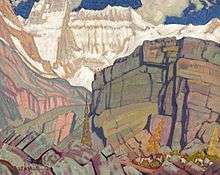Mount Lefroy
| Mount Lefroy | |
|---|---|
 The mountain at Abbot Pass | |
| Highest point | |
| Elevation | 3,423 m (11,230 ft) [1] |
| Prominence | 417 m (1,368 ft) [2] |
| Coordinates | 51°21′45″N 116°16′47″W / 51.36250°N 116.27972°WCoordinates: 51°21′45″N 116°16′47″W / 51.36250°N 116.27972°W [3] |
| Geography | |
 Mount Lefroy Location on Alberta/B.C. border | |
| Location | Alberta-B.C., Canada |
| Parent range | Bow Range |
| Topo map | NTS 82N/08 |
| Climbing | |
| First ascent | 1897[2] |
| Easiest route | West face (UIAA II)[1] |
Mount Lefroy is a mountain on the Continental Divide, at the border of Alberta and British Columbia in western Canada. The mountain is located on the eastern side of Abbot Pass which separates Lake Louise in Banff National Park from Lake O'Hara in Yoho National Park. Mount Victoria lies immediately on the western side of the pass.
The mountain was named by George M. Dawson in 1894 for Sir John Henry Lefroy (1817–1890), an astronomer who had traveled over 8,800 kilometres (5,470 mi) in Canada's north between 1842-44 making meteorological and magnetic observations.[1]
The mountain is the site of the first fatal climbing accident in Canada. In 1896 during a failed summit bid, Phillip S. Abbot slipped on rocks after just coming off an icy section and plummeted down the rock face to his death.[1]
A prominent painting by Canadian Group of 7 artist Lawren Harris, was painted at this site.[4]

References
- 1 2 3 4 Birrell, Dave. "Mount Lefroy". Peakfinder. Retrieved 2010-08-11.
- 1 2 "Mount Lefroy". Bivouac.com. Retrieved 2008-10-05.
- ↑ "Mount Lefroy". BC Geographical Names. Retrieved 2012-08-08.
- ↑ "Lawren S. Harris, Mt. Lefroy, 1930". Art!Facts. McMichael Canadian Art Collection. 2006. Retrieved 2010-08-11.